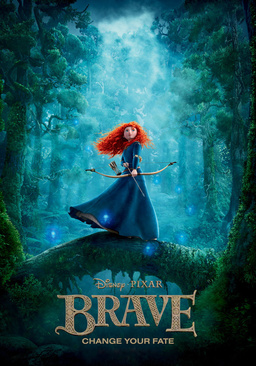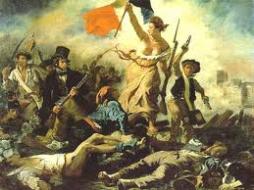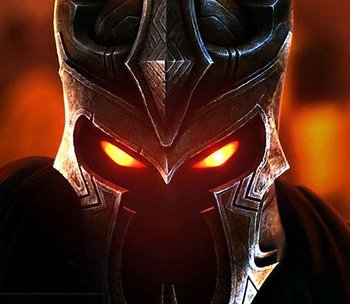Why Evil Overlords Need to be Competent
56. My Legions of Terror will be trained in basic marksmanship. Any who cannot learn to hit a man-sized target at 10 meters will be used for target practice.
(From The Top 100 Things I’d Do If I Ever Became An Evil Overlord by Peter Anspach)
We geeks love to laugh at the incompetent evil overlords of TV and cinema Fantasy. In the past we tolerated them because — like 1970s gays embracing their own particular reading of Batman — we were pathetically grateful for whatever bones mainstream culture deigns to toss our way. However, we never really put up with this in printed Fantasy.
Obviously, if the Evil Overlord does not exploit his every possible advantage, then we cease to believe in them (if they are so stupid, how come they got to be an Evil Overlord?). Our suspension of disbelief collapses, and we are catapulted out of the story.
However, there’s a deeper reason to reject incompetent Evil Overlords. They result in stories that teach false wisdoms with obnoxious implications.
Seriously! Let me illustrate using the story Piers versus the Overlord, (first book in the ten volume Straw Man Trilogy):
Thograr the Evil Overlord sits in his mighty Castle of R’Ar dominating the local countryside. However, the castle has a secret backdoor. If only a brave hero could sneak in and steal Thograr’s Talisman of Doom, then he could be defeated. Piers the Plow Boy is just such a hero…
 What’s wrong with this is that it’s like one of those old initiation ceremonies: the only real test is one of bravery. Piers (Medievalists will have spotted the in-joke immediately) only has to find the courage to take on the overlord and — Phut! — he is gone.
What’s wrong with this is that it’s like one of those old initiation ceremonies: the only real test is one of bravery. Piers (Medievalists will have spotted the in-joke immediately) only has to find the courage to take on the overlord and — Phut! — he is gone.
It’s saying that “Courage is all you need to defeat Evil,” a patently false wisdom since life doesn’t work like that. Standing up to bullies doesn’t always make them back down. Standing up to oppressive regimes often involves you being mown down rather than them backing down.
Worse, the implication of this is that “oppressed people are just cowards.” Thograr has mistreated these peasants for a generation. It took all this time to produce just one plow boy brave enough to defeat him. Obviously, then, the victims are at fault. The same thing happens whenever a female character liberates herself by simply standing up to her pre-modern patriarchal society, Disney’s Brave being an obvious big-screen offender, or when gay characters overturn a thousand years of homophobia by standing up and being counted.
Now, suppose Piers does encounter some opposition:
Piers sneaks past the sentries but encounters Thograr’s evil henchman Bert the Mighty. During a wild sword fight, Piers’s manly strength acquired from years of toil in the fields gives him the upper hand and he defeats Bert.
These things — castles, swords, military drill — are not supposed to be mere window dressing. They are tools of established technologies (by which I mean systems of practical knowledge comprising know-how and the tool to exploit that know-how).
However, if Piers can easily get into a well guarded-castle, then building a castle and setting up sentries is a waste of time. If our untrained hero can defeat an experienced swordsman, then experience and training count for nothing. So if “bravery is all”, then “90% of human endeavor is futile”.
Finally:
At last Piers stands over the body of Thograr. The people are free to return to their bucolic idyll!

If the peasants had risen against Thograr, stormed the Castle of R’Ar, hundreds of them would have died. The peasants would have had to slaughter the guards, including local lads who had enlisted up to avoid starvation, and young recruits who had not yet had time to commit any atrocities. The fight might have ended in a standoff, with some uncomfortable compromise required to get surviving soldiers to leave the land. In the aftermath, some of the peasants would find it hard to go back to being farmers, and natural leaders would have found themselves leading whether they liked it or not. Nothing would have been the same again.
The easy victory of Piers, however, is saying that “change can come free of a human and moral price”. The same thing happens whenever somebody introduces new technology to Fantasy Land or frees the slaves without causing major and distasteful upheavals. Not only does this take us back to victim blaming, it also implies that people who are cautious about change are morally as bad as the institutions they are reluctant to tackle. Worse, it sets impossibly high standards for those who do throw off their shackles or liberate others but who fall short of achieving a bloodless coup resulting in the legally valid trial of the former dictator.
* * *
I like to think that this is the real reason why we recoil from stories with incompetent Evil Overlords. We are not just consumers rejecting a defective product; we are humans outraged by cloying lies about the way life works. We demand that even the wildest Fantasy yarns should be grounded in deep human reality.
If so, I have high hopes for geeks in particular and humanity in general. A good note on which to finish my blogs for this year.
M Harold Page (www.mharoldpage.com) is a Scottish-based writer and swordsman. He has been living off his writing for a year now and has three books on Amazon.

There is one important lesson to be learnt from stories about evil overlords: never, ever apply for a job as an evil overlord’s minion. Not only do you have to live with the possibility your employer might kill you at any moment, the work is demeaning and the hours are absolutely terrible.
…which of course is another false lesson: evil overlords, historically, have been very good at looking after their men – or at least those who make it into the inner circle.
I feel the blog was overly harsh on Disney’s Brave. Merida was able to challenge the established patriarchal society not simply because she had the courage to do so. No, she was able to challenge patriarchal society because her father was an absolute monarch and he doted on her. If you are sufficiently powerful you can flout the conventions of society. Indeed, Merida is an example of displaying royal authority by rubbing other people’s noses in your unconventional behaviour.
There is also the element of hubris. My castle is known to be impregnable. I have guards, but the castle has never been successfully assaulted and so the guards also know the castle is impregnable. My enemies know this, too, so they dare not attack me in my fortress.
however, nobody pays any attention to the shepherds. They are scum. And know nothing worth knowing.
Except a desperate enemy talks to a shepherd one day, or a disgruntled guard, and discovers there is a way into the castle that nobody pays any attention to. And so the enemy’s crack warriors follow their guide…
cf Thomas Randall’s capture of Edinburgh Castle in 1314, Ephialtes at Thermopylae…
Re Merida: I think you’re being EVEN harsher; her’s is not a feminist victory, merely one of privilege. My biggest issue is that she is a princess who rides around the countryside unescorted.
Re Edinburgh Castle and Ephialtes: Both involve a leading bodies of actual soldiers through the backdoor. Neither would be particularly interesting climaxes to novels. The subsequent fighting, however, might be.
Good point, Harold! I guess that means – in the interests of realism – a book about a henchmen mc who loves his job?
All joking apart, I think it can be easy to confuse success with doing what is right. Most fantasies glorify heroism. Maybe this is unrealistic – but (if you wanted to be realistic) you’d make your mc an evil overlord: ruthless and crafty. In the real world, nice guys finish last.
Nice guys don’t always finish last! Robert de Bruce, William Marshal and the Duke of Wellington being good examples.
@ Aonghus
I would struggle to call Gandalf “nice”. Or Aslan, Druss the Legend, Katsa, Severus Snape, Chris Gordon, Granny Weatherwax..
Fantasy fiction is full of heroes who are ruthless, crafty, and are on the side of “good.” Indeed, they often struggle against their own tendencies towards viciousness, spite, greed, fear. desire for power as much as they struggle against the Evil Overlord.
Also, some of the heroes “win” even though they “lose.” Druss gets killed. Gandalf, Galadriel and Elrond (and Frodo) have to flee the Middle Earth they fought to save.
I guess my point was that if M.H.P. wanted fantasy and historical fiction to be more realistic (and by extension, to contain lessons that might be useful to the modern reader) he might be better off focussing on the evil overlord than Piers the Plow Boy. After all, this is a successful businessman who pays his employees well, has to a position of considerable prominance in society (and crucially, is able to maintain it) while exploiting those around him. There are plenty of modern equivalents – Rupert Murdoch or Pinochet to cite two – so we know this particular template will have a certain resonance with modern readers, even when it’s transplanted to a quasi-historical setting.
Modern heroes on the other hand – heroes who also resemble the heroes of your average fantasy book (or work of historical fiction): they’re kind of thin on the ground, if not downright non-existent. So maybe – unlike the villainous baron – the fantasy/historical hero is a redundant role model? I’m open to correction….
Good article Martin, wonderful comments.
I gather your point Aonghus, applaud its ingenuity, but I’ll still write of heroes no matter how redundant they may appear. My heroes tend to be more like Jack Bauer of TV’s ’24’ series though – like Douglas says,”ruthless, crafty…often struggle against their own tendencies towards viciousness, spite, greed, fear, desire for power as much as they struggle against the Evil Overlord…and are on the side of ‘good.’,” pursuing a greater true good despite the personal cost and what the liberalities of ‘civilized’ man might consider ‘better’ or ‘correct.’
@Aonghas
is the mythical hero a redundant role model?
Well, I have never known anyone struggle to control a Ring of Power, or to fight a rearguard action against a dragon whilst the villagers make their escape. But one key element of the fantasy hero is that individual actions matter. And this I have seen. And I have also found myself faced with a “hero moment” once or twice.
For example. Who will be the first person in the office to challenge institutional racism, sexism or any other form of bullying? Who will be the first person to challenge the systematic production of false statistics, whether that be financial planning or patient treatment figures? Who will take time out of their busy lives in order to ease the pain felt by the victims of our current social processes, whether that be the long-term unemployed or the refugee or the isolated old person? Who will tell their boss they are putting family before career? Who will go towards the troubled places in order to help, rather than keep well away?
Often the first person to take a stand inspires others and plays a key role in bringing about change. Often the first person to take a stand gets crushed by the powerful. Often we notice those who have the best PR rather than those who are the most heroic. How often do we hear about those manning soup kitchens, visiting prisoners, feeding the hungry? How often do we hear about those who put in a huge effort, but find themselves stalled at the airport because local political pressure will not let the international rescue team have access to the disaster site?
Heroism in the mythical mould? There is an awful lot of it about, but the powerful don’t want the stories to spread. And a lot of the stories do not fit the pattern we seek, as heroes often get crushed along with those they sought to save.
My favourite “Piers the ploughboy v the Evil Overlord” story has the following implied context:
Piers spends time getting to know the Evil Overlord’s habits and attitudes. His appetites, his cruelty, his vanity, his greed, his belief that the gods will speak to him and not to lesser men.
Piers inveigles himself into the position of the person from the community who delivers the protection money to the Evil Overlord.
Piers cultivates the reputation of being a man to whom the gods speak.
Piers is really called Ehud.
And so the story begins…
the Lord strengthened Eglon the king of Moab against Israel, because they had done evil in the sight of the Lord. And he gathered to himself the sons of Ammon and Amalek; and he went and defeated Israel, and they possessed the city of the palm trees. The sons of Israel served Eglon the king of Moab eighteen years.
But when the sons of Israel cried to the Lord, the Lord raised up a deliverer for them, Ehud the son of Gera, the Benjamite, a left-handed man. And the sons of Israel sent tribute by [b]him to Eglon the king of Moab. Ehud made himself a sword which had two edges, a cubit in length, and he bound it on his right thigh under his cloak. He presented the tribute to Eglon king of Moab. Now Eglon was a very fat man. It came about when he had finished presenting the tribute, that he sent away the people who had carried the tribute. But he himself turned back from the idols which were at Gilgal, and said, “I have a secret message for you, O king.” And he said, “Keep silence.” And all who attended him left him. Ehud came to him while he was sitting alone in his cool roof chamber. And Ehud said, “I have a message from God for you.” And he arose from his seat. Ehud stretched out his left hand, took the sword from his right thigh and thrust it into his belly. The handle also went in after the blade, and the fat closed over the blade, for he did not draw the sword out of his belly; and the refuse came out. Then Ehud went out into the vestibule and shut the doors of the roof chamber behind him, and locked them.
When he had gone out, his servants came and looked, and behold, the doors of the roof chamber were locked; and they said, “He is only relieving himself in the cool room.” They waited until the point of embarrassment; but behold, he did not open the doors of the roof chamber. Therefore they took the key and opened them, and behold, their master had fallen to the floor dead.
Now Ehud escaped while they were delaying, and he passed by the idols and escaped to Seirah. It came about when he had arrived, that he blew the trumpet in the hill country of Ephraim; and the sons of Israel went down with him from the hill country, and he was in front of them. He said to them, “Pursue them, for the Lord has given your enemies the Moabites into your hands.” So they went down after him and seized the fords of the Jordan opposite Moab, and did not allow anyone to cross. They struck down at that time about ten thousand Moabites, all robust and valiant men; and no one escaped.
NOTE on numbers: a “thousand” was a term that could mean one thousand people, or it could mean a regiment, or it could mean someone worthy of commanding a regiment (what in the Middle Ages we would call a knight).
I think Douglas’s story is an example of how it can be done. No secret passage, no easily exploited weakness. Instead social and moral costs, not to mention physical peril.
And more generally in narrative fiction, the heroes are measured by their enemies. They are only as bad-ass as their baddest villain counterpart. When Spider-Man is thwarting thugs, jewel thieves, bank robbers, who cares? He needs a Green Goblin. Batman needs a Joker.
Tolkien set the standard with Sauron, I think, and it is one element that Peter Jackson capitalized on pretty effectively: this sense that the whole world is in grave danger, that the outcome is very much in doubt, that there is a cost in countless lives even in victory. Sauron may be defeated in the end, but how many lie dead on battlefields, how many kingdoms leveled, forests burned, and how much can never be reclaimed? The elves are leaving the world; magic is waning away. This fact that the victory is not just a reset back to “happy-time” status quo, but comes with a great loss and a wistful sadness for the things that are passing, is what makes LOTR an adult work.